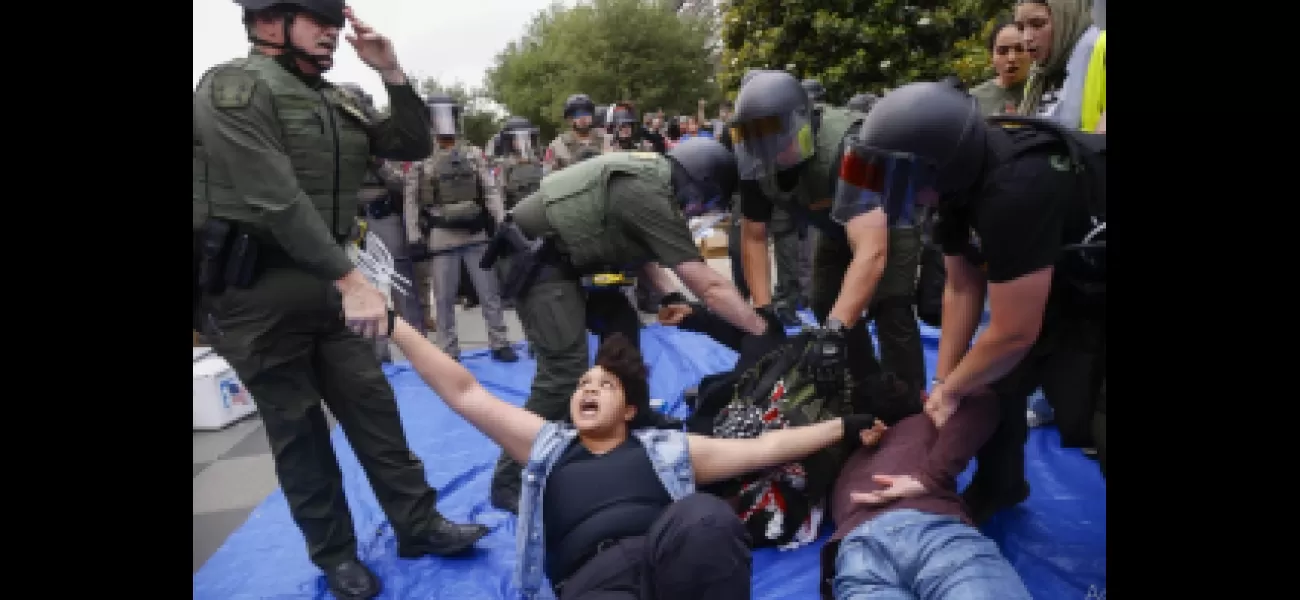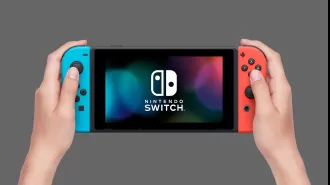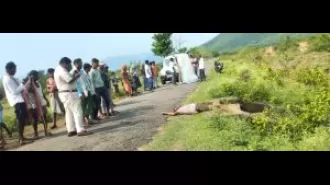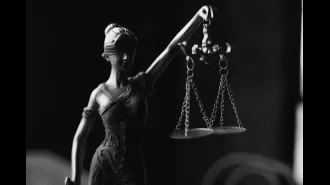Cops dismantle Palestinian protesters' camp at UCLA.
LA police took down barricades and broke up a pro-Palestinian encampment at UCLA after protesters refused to leave, following a previous attack.
May 2nd 2024.

Early on Thursday morning, in Los Angeles, a tense situation unfolded at the University of California, Los Angeles campus. The police had removed barricades and were starting to take down a fortified encampment that had been set up by pro-Palestinian demonstrators. This came after hundreds of protesters refused to leave, even after being ordered to do so by the police. The previous night, a group of counter-protesters had attacked the tent encampment, prompting this law enforcement action.
For hours, the police had been using loudspeakers to warn the protesters that they would be arrested if they did not disperse. Despite this, hundreds of people had gathered on the campus to show their support for the cause. Some were inside the barricaded tent encampment, while others stood outside of it. As police helicopters flew overhead, the sound of flash-bangs could be heard, which are used to disorient and stun people. The protesters chanted, questioning the police's actions.
The police began to systematically take apart the barricade that had been constructed around the tents, which consisted of plywood, pallets, metal fences, and trash dumpsters. They created an opening and started to take down the tents and canopies. The demonstrators, armed with umbrellas as shields, faced off with the officers. Some of them warned their fellow protesters to be prepared in case the police used tear gas or other irritants.
This police action came after the UCLA administration and campus police had waited for hours to intervene in the counter-protesters' attack the previous night. This delay was met with criticism from Muslim students, California Governor Gavin Newsom, and others. Despite this, the demonstrators had rebuilt their makeshift barriers while the police watched.
Across the country, similar tent encampments had been set up by students, calling on universities to end their business ties with Israel or companies that support the ongoing conflict in Gaza. This movement, unlike any other in this century, had spread to various campuses. The police's actions in removing these encampments were reminiscent of the crackdowns that occurred during the Vietnam War protests many years ago.
The events at UCLA were even being broadcasted live in the Middle East, with Iranian and Qatari television networks showing footage of the police action. The tension-filled standoff at the university had come just one night after violence had erupted in the same place, instigated by counter-protesters.
The increased police presence and continued warnings were in stark contrast to the previous night's events when the counter-protesters had attacked the pro-Palestinian encampment. Despite the use of pepper spray and other violent tactics, no arrests were made. However, at least 15 protesters were injured, and this response from the authorities received widespread criticism.
By Wednesday afternoon, the encampment had become a small city, with hundreds of people and tents set up on the campus quad. As the sun began to set, some protesters were seen praying, while others chanted "we're not leaving." They handed out protective gear like goggles and surgical masks, and discussions were had on how to handle potential tear gas or pepper spray. Some even constructed shields out of plywood in case they were met with violence.
Outside of the encampment, a crowd had gathered, including students, alumni, and members of the community, all showing their support for the pro-Palestinian demonstrators. Nearby, a group of students wearing T-shirts in support of Israel and Jewish people held signs and protested. As the night went on, more and more officers arrived on the campus, and the crowd continued to grow.
Ray Wiliani, who lived nearby, had come to the campus to support the pro-Palestinian demonstrators. He stated that it was important to take a stand for their cause and that enough was enough. This tense situation at UCLA showed the growing divide between those supporting Palestine and those supporting Israel, and how it had spread to university campuses.
In the early hours of Thursday morning, the University of California, Los Angeles campus was buzzing with activity as police worked to dismantle a fortified encampment set up by pro-Palestinian demonstrators. Despite repeated orders to disperse, hundreds of protesters remained, leading to a tense standoff between law enforcement and the demonstrators.
As police helicopters circled overhead, the sound of flash-bangs could be heard as officers began to tear down the barricades and tents that made up the encampment. Some of the protesters held umbrellas as shields, anticipating a potential use of tear gas by the police. The scene was a stark contrast to the previous night, when counter-protesters had attacked the encampment, resulting in injuries and criticism of the police's delayed response.
The encampment had been set up as part of a larger student movement calling on universities to stop doing business with Israel and companies that support the war in Gaza. This movement, which has spread to campuses nationwide, has drawn comparisons to protests against the Vietnam War in the past. The tension at UCLA was amplified by the fact that the police action was being broadcast live on television networks in the Middle East and Israel.
The night before, the campus had descended into chaos as counter-protesters clashed with the pro-Palestinian demonstrators. The lack of intervention by authorities drew widespread condemnation, with several individuals sustaining injuries. But on this night, the law enforcement presence was much more prominent, with officers forming skirmish lines and warning the protesters to disperse or face arrest.
Despite the tension and looming threat of arrests, the pro-Palestinian demonstrators remained resolute. As the sun set over the campus, some prayed while others chanted and passed out protective gear. Some even constructed makeshift shields in case of a confrontation with the police. Meanwhile, a crowd of students, alumni, and locals gathered on the steps nearby, showing their support for the demonstrators.
Among the crowd was Ray Wiliani, a nearby resident who had come to show his support for the pro-Palestinian cause. He expressed his frustration with the ongoing conflict and the need to take a stand against it. As the night wore on and more officers arrived on campus, the tension continued to escalate. It was a dramatic and emotional scene, with both sides standing their ground and refusing to back down.
In the end, the police were able to dismantle the encampment and disperse the protesters, but the message of the pro-Palestinian movement had been heard loud and clear. The events at UCLA were just a small part of a larger and ongoing struggle, but they served as a reminder of the power of student activism and the importance of standing up for what one believes in.
For hours, the police had been using loudspeakers to warn the protesters that they would be arrested if they did not disperse. Despite this, hundreds of people had gathered on the campus to show their support for the cause. Some were inside the barricaded tent encampment, while others stood outside of it. As police helicopters flew overhead, the sound of flash-bangs could be heard, which are used to disorient and stun people. The protesters chanted, questioning the police's actions.
The police began to systematically take apart the barricade that had been constructed around the tents, which consisted of plywood, pallets, metal fences, and trash dumpsters. They created an opening and started to take down the tents and canopies. The demonstrators, armed with umbrellas as shields, faced off with the officers. Some of them warned their fellow protesters to be prepared in case the police used tear gas or other irritants.
This police action came after the UCLA administration and campus police had waited for hours to intervene in the counter-protesters' attack the previous night. This delay was met with criticism from Muslim students, California Governor Gavin Newsom, and others. Despite this, the demonstrators had rebuilt their makeshift barriers while the police watched.
Across the country, similar tent encampments had been set up by students, calling on universities to end their business ties with Israel or companies that support the ongoing conflict in Gaza. This movement, unlike any other in this century, had spread to various campuses. The police's actions in removing these encampments were reminiscent of the crackdowns that occurred during the Vietnam War protests many years ago.
The events at UCLA were even being broadcasted live in the Middle East, with Iranian and Qatari television networks showing footage of the police action. The tension-filled standoff at the university had come just one night after violence had erupted in the same place, instigated by counter-protesters.
The increased police presence and continued warnings were in stark contrast to the previous night's events when the counter-protesters had attacked the pro-Palestinian encampment. Despite the use of pepper spray and other violent tactics, no arrests were made. However, at least 15 protesters were injured, and this response from the authorities received widespread criticism.
By Wednesday afternoon, the encampment had become a small city, with hundreds of people and tents set up on the campus quad. As the sun began to set, some protesters were seen praying, while others chanted "we're not leaving." They handed out protective gear like goggles and surgical masks, and discussions were had on how to handle potential tear gas or pepper spray. Some even constructed shields out of plywood in case they were met with violence.
Outside of the encampment, a crowd had gathered, including students, alumni, and members of the community, all showing their support for the pro-Palestinian demonstrators. Nearby, a group of students wearing T-shirts in support of Israel and Jewish people held signs and protested. As the night went on, more and more officers arrived on the campus, and the crowd continued to grow.
Ray Wiliani, who lived nearby, had come to the campus to support the pro-Palestinian demonstrators. He stated that it was important to take a stand for their cause and that enough was enough. This tense situation at UCLA showed the growing divide between those supporting Palestine and those supporting Israel, and how it had spread to university campuses.
In the early hours of Thursday morning, the University of California, Los Angeles campus was buzzing with activity as police worked to dismantle a fortified encampment set up by pro-Palestinian demonstrators. Despite repeated orders to disperse, hundreds of protesters remained, leading to a tense standoff between law enforcement and the demonstrators.
As police helicopters circled overhead, the sound of flash-bangs could be heard as officers began to tear down the barricades and tents that made up the encampment. Some of the protesters held umbrellas as shields, anticipating a potential use of tear gas by the police. The scene was a stark contrast to the previous night, when counter-protesters had attacked the encampment, resulting in injuries and criticism of the police's delayed response.
The encampment had been set up as part of a larger student movement calling on universities to stop doing business with Israel and companies that support the war in Gaza. This movement, which has spread to campuses nationwide, has drawn comparisons to protests against the Vietnam War in the past. The tension at UCLA was amplified by the fact that the police action was being broadcast live on television networks in the Middle East and Israel.
The night before, the campus had descended into chaos as counter-protesters clashed with the pro-Palestinian demonstrators. The lack of intervention by authorities drew widespread condemnation, with several individuals sustaining injuries. But on this night, the law enforcement presence was much more prominent, with officers forming skirmish lines and warning the protesters to disperse or face arrest.
Despite the tension and looming threat of arrests, the pro-Palestinian demonstrators remained resolute. As the sun set over the campus, some prayed while others chanted and passed out protective gear. Some even constructed makeshift shields in case of a confrontation with the police. Meanwhile, a crowd of students, alumni, and locals gathered on the steps nearby, showing their support for the demonstrators.
Among the crowd was Ray Wiliani, a nearby resident who had come to show his support for the pro-Palestinian cause. He expressed his frustration with the ongoing conflict and the need to take a stand against it. As the night wore on and more officers arrived on campus, the tension continued to escalate. It was a dramatic and emotional scene, with both sides standing their ground and refusing to back down.
In the end, the police were able to dismantle the encampment and disperse the protesters, but the message of the pro-Palestinian movement had been heard loud and clear. The events at UCLA were just a small part of a larger and ongoing struggle, but they served as a reminder of the power of student activism and the importance of standing up for what one believes in.
[This article has been trending online recently and has been generated with AI. Your feed is customized.]
[Generative AI is experimental.]
0
0
Submit Comment





